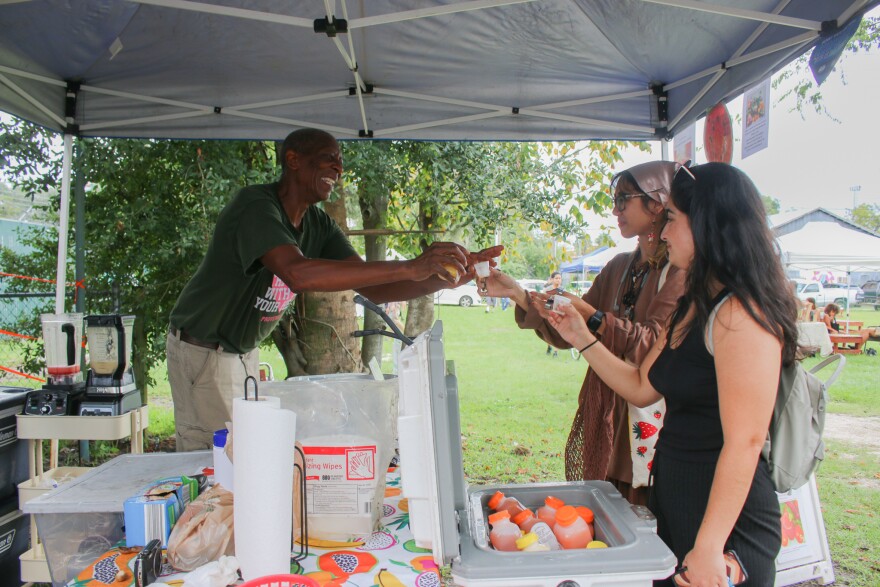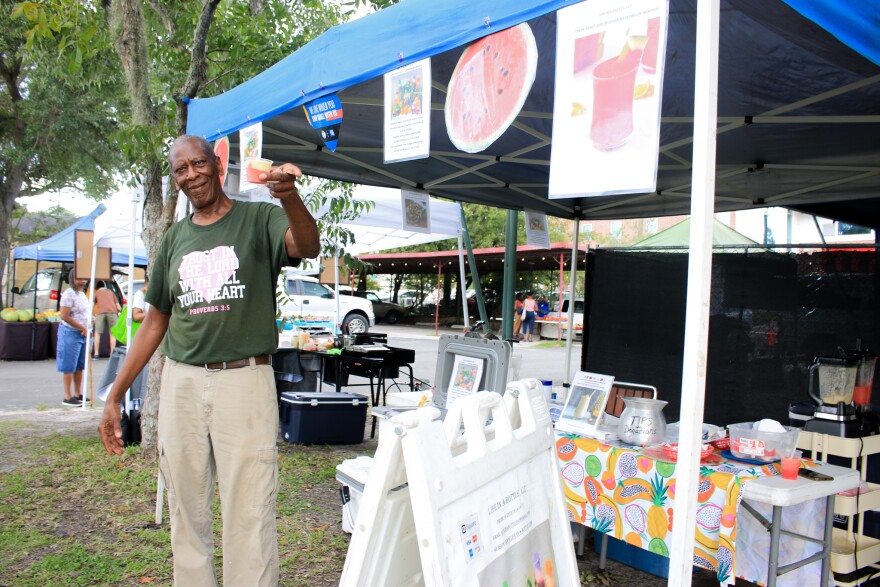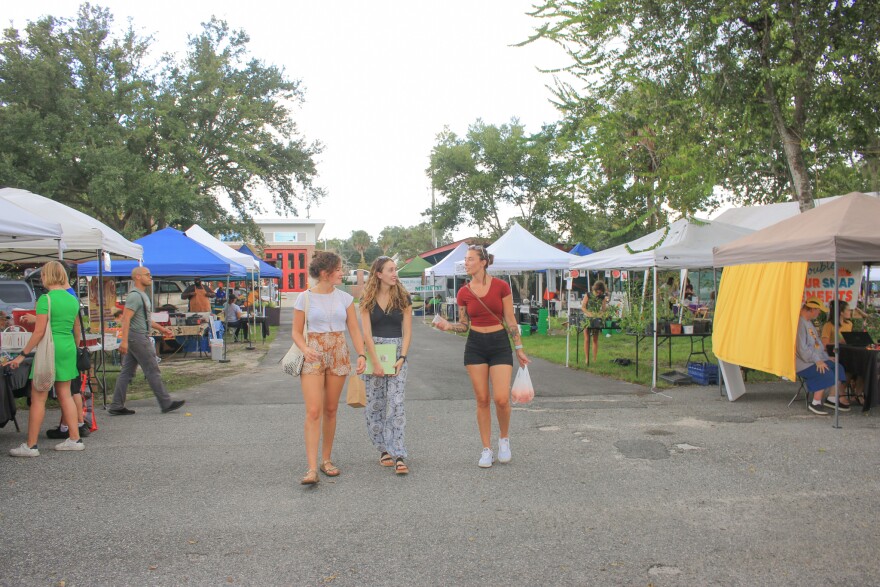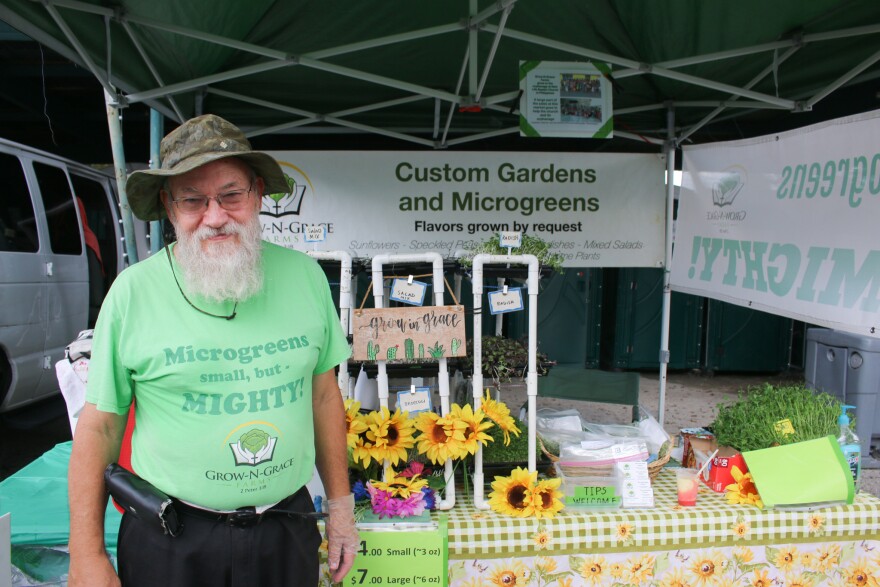On a September summer evening, families, couples, and people alike navigate dozens of tents with veggie filled tote bags, colorful smoothies, and handheld fresh dishes. Amid the bustling chaotic good are hurting farmers that are challenging the inflation crisis that has plagued agribusinesses in 2022.
Due to the current economic crisis, prices on produce and products have not only increased in grocery stores but for specialty agribusinesses. These homegrown businesses have had to adapt to changes in production, sourcing, and their consumer engagement. Consumers now will see an increase in produce price on a local level while some specialty agribusinesses are concerned with their ability to continue under a pinch.
Elijah "Big Fish" Gurman has been in the food industry for 17 years and is the proud chef of craft hand packed vinegar-based pickles. His menu features names like ‘Mean Pineapple Punch’ and ‘Mango Banger’ that deliver his flavorful pickles along with fruits and veggies galore.
“Everyone doesn’t love everything, but everyone loves something,” Gurman said. He has a large variety that could be cumbersome but attracts a wide spread of people to his business.
Proud Pickles sprouted in 2020 when the COVID-19 lockdown first began as a “Hail Mary” to pay rent. He wasn’t sure it would bring in enough income, but something was better than nothing.
“Thankfully, Gainesville loves pickles,” Gurman said. “Very few days feel like work. It’s exciting, energetic and something to put crazy work ethic into.”
However along with other specialty agribusinesses, Gurman found difficulty pricing his product amidst the inflation crisis. After a few months of deliberation, he increased prices for packed pickles.
The Proud Pickles owner echoed that being an agribusiness can be difficult because it’s easy for people to forget about his business. The specialty agribusiness takes plenty of buildup and time, but it is easy for a hiccup like inflation, to cause a quick decline on slim margins.
“I hope things take a turn for the better. These days, just surviving the days and months feels like a victory. It’s a shame for myself and others. I don’t want that to be the goal…‘oh we’re just getting by.’ I want people to be doing well and have abundance,” Gurman said.
He hopes agribusinesses and consumers learn to be cleverer, save resources and start learning how to be prepared for contingencies.
Gurman feels that policies being passed that directly impact individually owned businesses are creating a larger challenge.
“What happens when all these individual businesses can’t afford huge investments? What happens when every single one closes and we don’t have those options,” Gurman said.
If policies continue to create larger obstacles for individually owned businesses, it could lead to the extinction of many individually owned specialty agribusinesses in Gainesville. The decreasing number of businesses that supply and work with fresh produce in the city would only contribute to a bigger problem: food insecurity.
The U.S. Department of Agriculture (USDA) defines food insecurity as a lack of consistent access to enough food for an active and healthy life.
Willie Robinson is the owner of Life In A Bottle, LLC. Very early on, Robinson understood the importance behind food security. It began with watching his grandmothers’ techniques on preserving jellies and jams and developed into taking master courses on not only preservation but pasteurizing.
Robinson has been a master gardener for over 40 years planting all sorts of greens and fruits. He experienced an overflowing harvest that inspired him to create healthy juices at home that later led to Life In A Bottle.
Now, what doesn’t come from his plentiful garden of fruits and veggies, comes from other local gardens. Robinson seeks the freshest and most wholesome produce he can find.
Because of inflation challenges, Robinson increased his prices on single units by 50 cents and made increases on double units.
“Being a smart shopper. Being diligent to find the best price and produce, that’s important to me, just as everybody,” Robinson said.
Regardless of the economic crisis, Robinson strives to deliver his blended smoothies, juices, and foreseeable teas to the masses.
“My desire is to give other people the satisfaction and opportunity to get the benefits I get,” Robinson said. “Even with the cost going up, there is no greater baggage than good health.”
Health benefits aren’t the only driving force behind Robinson in these challenging times, it’s also fighting food insecurity.
“A lot of people don’t have the availability of fresh produce at a fair price,” Robinson said. “They don’t eat as much, don’t consume as fresh or organic vegetables because they think, ‘man it’s out of my price range.’”
Robinson's greatest desire during this crisis is to help educate people on the importance of eating healthier and fresher while also emphasizing how to preserve and decrease the perishable waste problem in agriculture.
“My hope is that people, the city council on the east side of Gainesville, consider the needs of the community and do what they can to secure a sustainable environment for fresh agriculture,” Robinson said.
He emphasized the key to food certainty is the availability of fresh whole food and its affordability.
However, affordability becomes a challenge when inflation effects the cost of production.
“It’s going to hurt a lot of people,” Tim Keyes said. “For everybody, they need to really reconsider what they’re doing as far as price rate and rate change.”
Keyes' concern stems from the recent Gainesville City Commission vote to increase Gainesville Regional Utility rates. GRU electric rates increased by 3% and wastewater rates by 5%. The GRU rates increases come considering inflation pressures as Mayor Lauren Poe declared last Thursday.
Because of these utility increases, agribusinesses such as Grown-N-Grace operated by Keyes and his partner Kitty Keyes have had to raise their prices on their produce specialty: microgreens and sunflower sprouts.
“We had a good reception, when we explained what was happening, they understood it and it wasn’t really surprising to them at all,” Tim Keyes said.
Grown-N-Grace saw no other option but to increase prices from $4 to $7 on their popular bag of microgreens. However, to combat nay-sayers, the Keyes additionally decided to increase the size of their produce for the customer, shifting from a 4-ounce bag of microgreens to 6-ounce instead.
Similarly, specialty agribusiness Southern Sun CBD has been working around the direct challenges to their production.
Tyler Griffin, owner, and farmer for Southern Sun CBD’s local hemp farm, prides his agribusiness in being an affordable CBD company. This has proven to be a challenge in the current economic crisis.
“We’ve been eating at our profits. It cuts out the bottom line,” Griffin said.
Packaging prices have increased for Southern Sun by 2 to 3 cents. More drastically, the base of one of the most popular products, the CBD Oil Drops (THC free), has increased $50 per 5 galloons. Altogether, the new price increases in production for Southern Sun have made them as far as 10% less profitable.
Despite the challenges faced by inflation, Griffin is optimistic and is motivated to continue production.
“I’m hoping it’s only a phase,” Griffin said. “Customers are the focus. The people whose sleep issues we’ve solved, those with autism, joint pains, the elderly; this really helps people. Money is not the driving force.”
These farmers share one common ask of the community: more people, especially the students in Gainesville, to learn about the importance behind their homegrown products and produce, valuing their place in the market and building up the community to support them more in these challenging times.
“There is more to food than just the cost, have a good piece of meat or a good pickle,” Gurman said.




